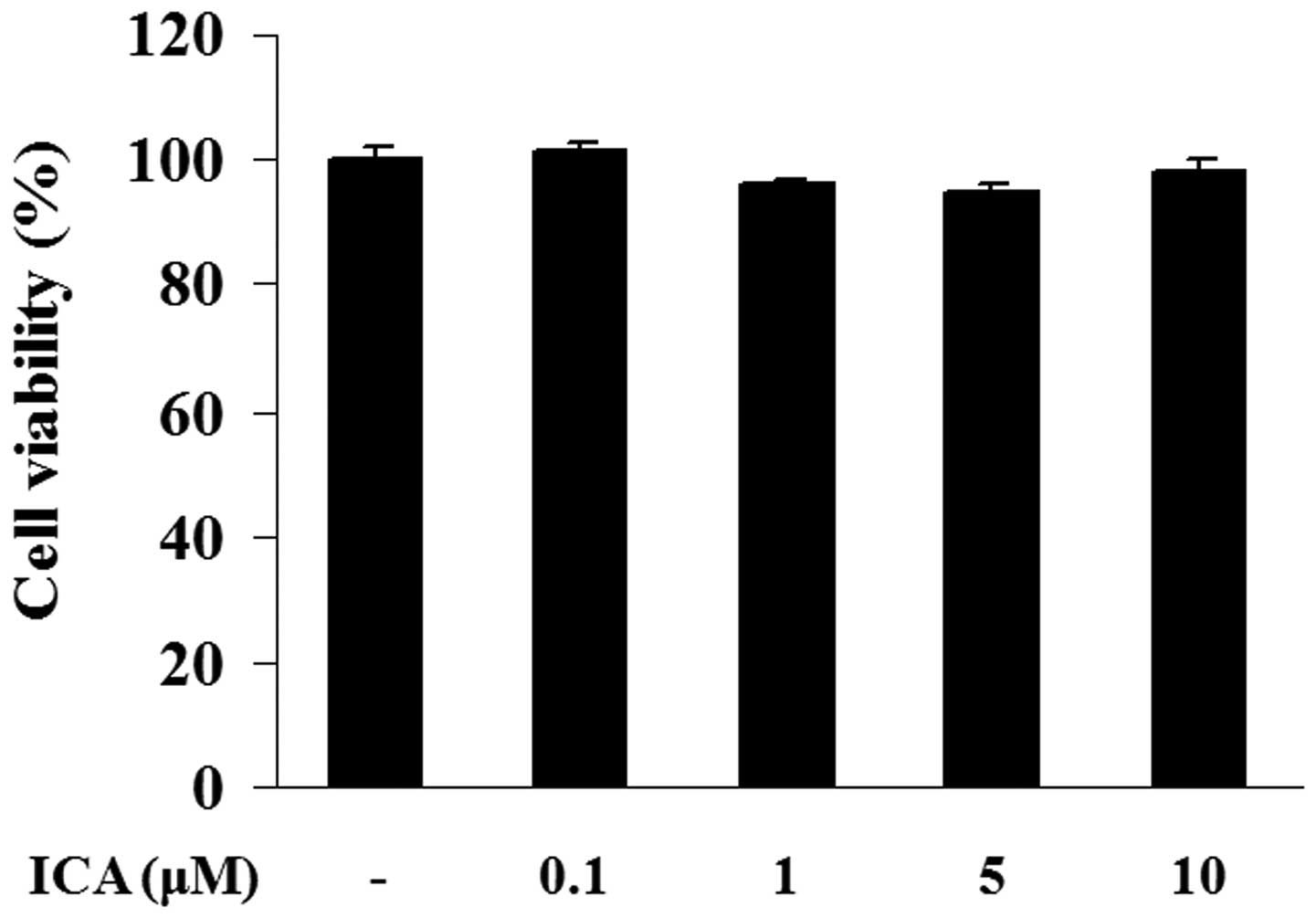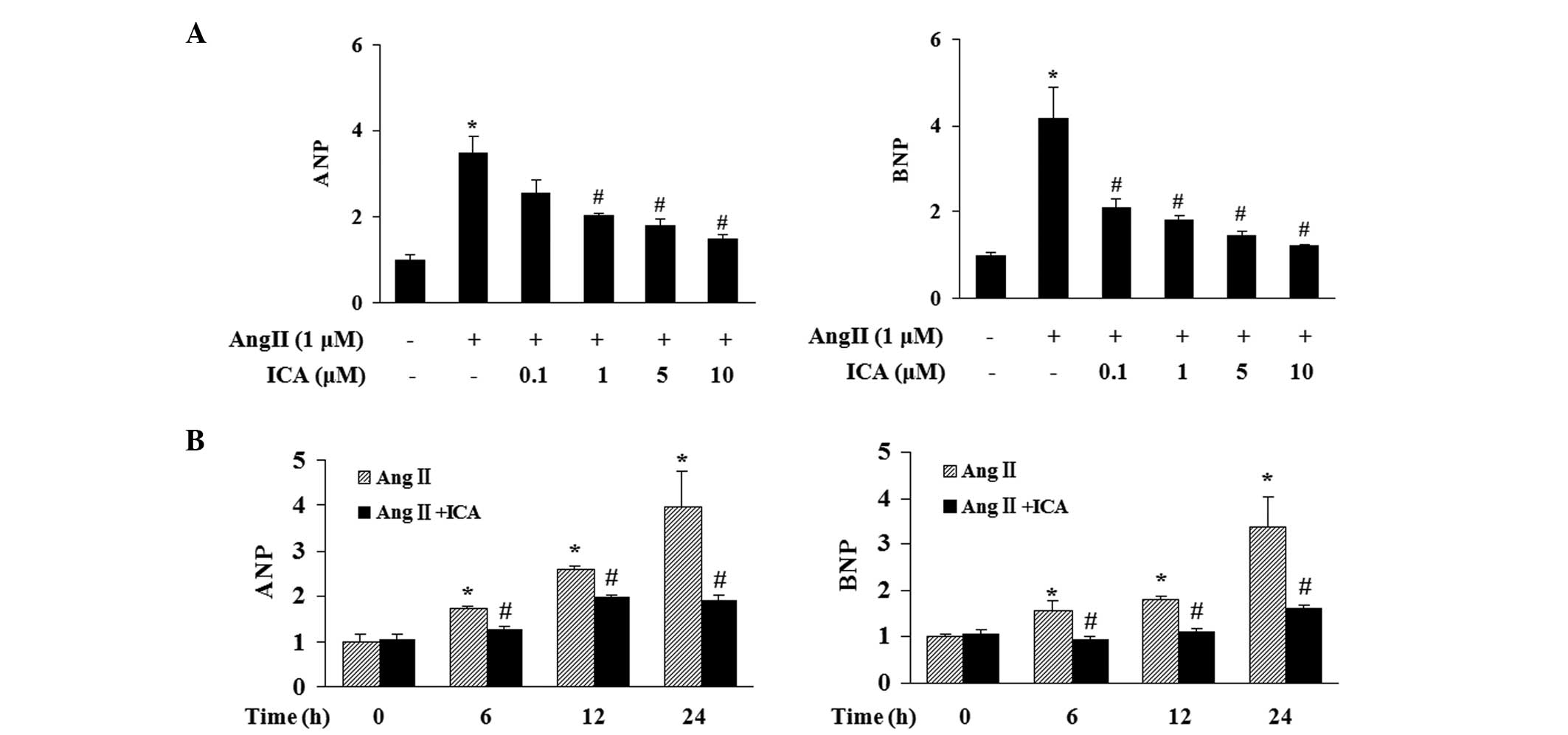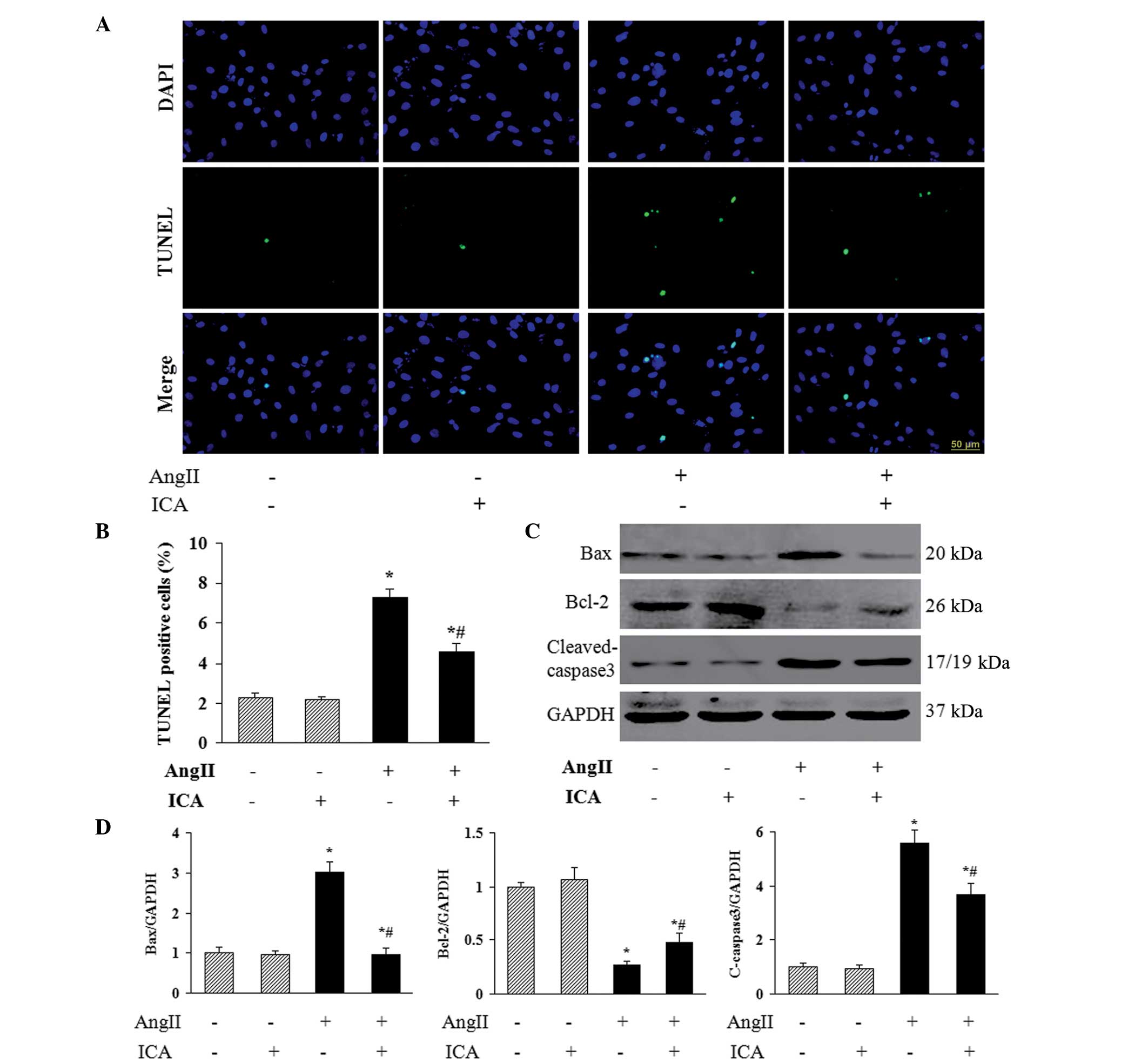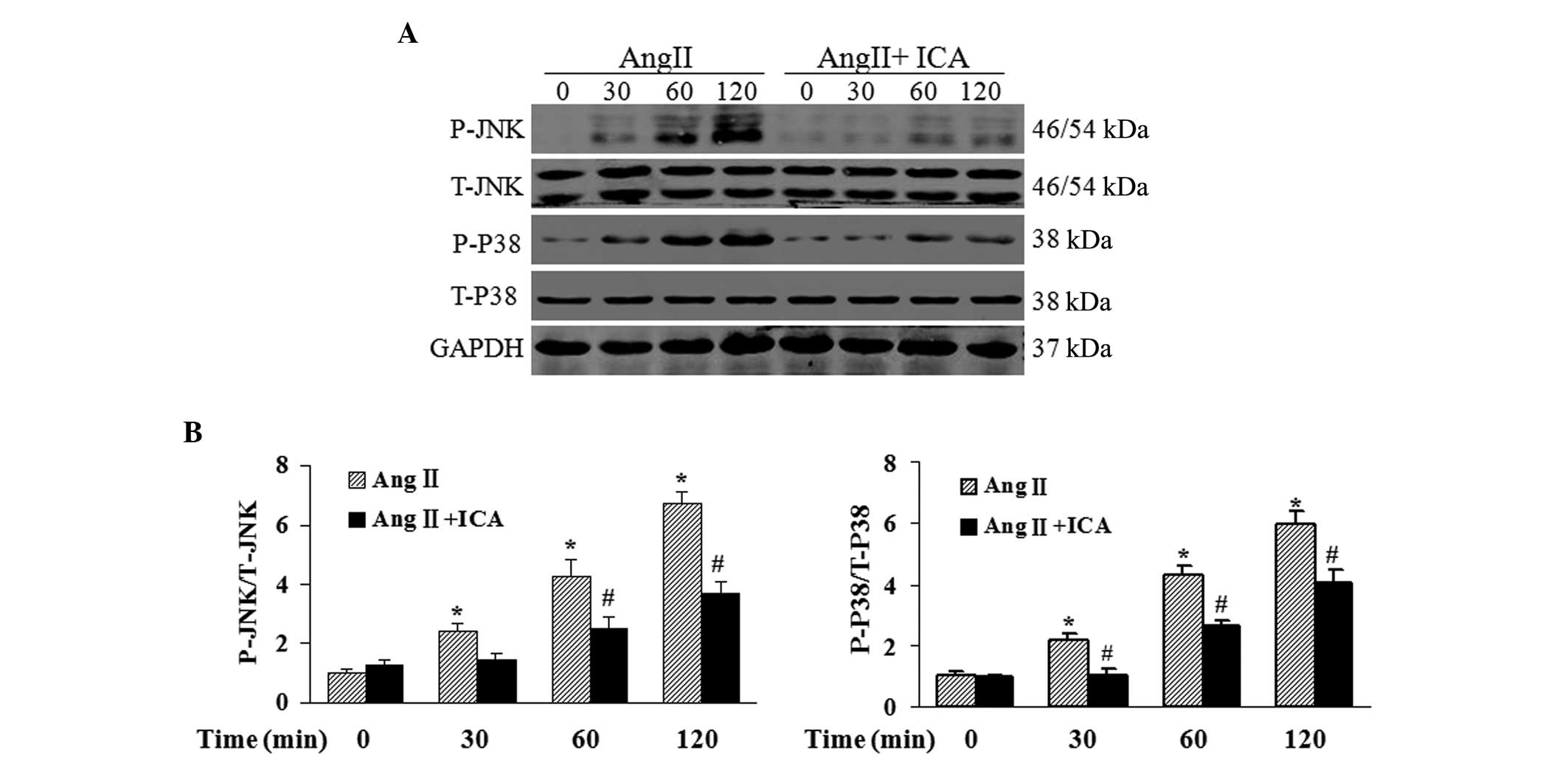|
1
|
Bui AL, Horwich TB and Fonarow GC:
Epidemiology and risk profile of heart failure. Nat Rev Cardiol.
8:30–41. 2011. View Article : Google Scholar : PubMed/NCBI
|
|
2
|
Shah AM and Mann DL: In search of new
therapeutic targets and strategies for heart failure: recent
advances in basic science. Lancet. 378:704–712. 2011. View Article : Google Scholar : PubMed/NCBI
|
|
3
|
Rohini A, Agrawal N, Koyani CN and Singh
R: Molecular targets and regulators of cardiac hypertrophy.
Pharmacol Res. 61:269–280. 2010. View Article : Google Scholar : PubMed/NCBI
|
|
4
|
van Berlo JH, Maillet M and Molkentin JD:
Signaling effectors underlying pathologic growth and remodeling of
the heart. J Clin Invest. 123:37–45. 2013.PubMed/NCBI
|
|
5
|
Mann DL, Barger PM and Burkhoff D:
Myocardial recovery and the failing heart: myth, magic, or
molecular target? J Am Coll Cardiol. 60:2465–2472. 2012. View Article : Google Scholar : PubMed/NCBI
|
|
6
|
Xu CQ, Liu BJ, Wu JF, et al: Icariin
attenuates LPS-induced acute inflammatory responses: involvement of
PI3K/Akt and NF-kappaB signaling pathway. Eur J Pharmacol.
642:146–153. 2010. View Article : Google Scholar : PubMed/NCBI
|
|
7
|
Li WW, Gao XM, Wang XM, Guo H and Zhang
BL: Icariin inhibits hydrogen peroxide-induced toxicity through
inhibition of phosphorylation of JNK/p38 MAPK and p53 activity.
Mutat Res. 708:1–10. 2011. View Article : Google Scholar : PubMed/NCBI
|
|
8
|
Song YH, Cai H, Gu N, Qian CF, Cao SP and
Zhao ZM: Icariin attenuates cardiac remodelling through
down-regulating myocardial apoptosis and matrix metalloproteinase
activity in rats with congestive heart failure. J Pharm Pharmacol.
63:541–549. 2011. View Article : Google Scholar
|
|
9
|
Chung BH, Kim JD, Kim CK, et al: Icariin
stimulates angiogenesis by activating the MEK/ERK- and
PI3K/Akt/eNOS-dependent signal pathways in human endothelial cells.
Biochem Biophys Res Commun. 376:404–408. 2008. View Article : Google Scholar : PubMed/NCBI
|
|
10
|
Nishida M, Tanabe S, Maruyama Y, et al: G
alpha 12/13- and reactive oxygen species-dependent activation of
c-Jun NH2-terminal kinase and p38 mitogen-activated
protein kinase by angiotensin receptor stimulation in rat neonatal
cardiomyocytes. J Biol Chem. 280:18434–18441. 2005.PubMed/NCBI
|
|
11
|
Zeng KW, Fu H, Liu GX and Wang XM: Icariin
attenuates lipopolysaccharide-induced microglial activation and
resultant death of neurons by inhibiting TAK1/IKK/NF-kappaB and
JNK/p38 MAPK pathways. Int Immunopharmacol. 10:668–678. 2010.
View Article : Google Scholar : PubMed/NCBI
|
|
12
|
Zhou H, Bian ZY, Zong J, et al: Stem cell
antigen 1 protects against cardiac hypertrophy and fibrosis after
pressure overload. Hypertension. 60:802–809. 2012. View Article : Google Scholar : PubMed/NCBI
|
|
13
|
Zhou H, Shen DF, Bian ZY, et al:
Activating transcription factor 3 deficiency promotes cardiac
hypertrophy, dysfunction, and fibrosis induced by pressure
overload. PLoS One. 6:e267442011. View Article : Google Scholar : PubMed/NCBI
|
|
14
|
Zhou H, Yang HX, Yuan Y, et al:
Paeoniflorin attenuates pressure overload-induced cardiac
remodeling via inhibition of TGFβ/Smads and NF-κB pathways. J Mol
Histol. 44:357–367. 2013.PubMed/NCBI
|
|
15
|
Hescheler J, Meyer R, Plant S, Krautwurst
D, Rosenthal W and Schultz G: Morphological, biochemical, and
electrophysiological characterization of a clonal cell (H9c2) line
from rat heart. Circ Res. 69:1476–1486. 1991. View Article : Google Scholar : PubMed/NCBI
|
|
16
|
Watkins SJ, Borthwick GM and Arthur HM:
The H9c2 cell line and primary neonatal cardiomyocyte cells show
similar hypertrophic responses in vitro. In Vitro Cell Dev Biol
Anim. 47:125–131. 2011. View Article : Google Scholar : PubMed/NCBI
|
|
17
|
Fortuño MA, Ravassa S, Fortuño A, Zalba G
and Díez J: Cardiomyocyte apoptotic cell death in arterial
hypertension: mechanisms and potential management. Hypertension.
38:1406–1412. 2001.PubMed/NCBI
|
|
18
|
Tsutsui H, Kinugawa S and Matsushima S:
Oxidative stress and heart failure. Am J Physiol Heart Circ
Physiol. 301:H2181–H2190. 2011. View Article : Google Scholar : PubMed/NCBI
|
|
19
|
Anilkumar N, Sirker A and Shah AM: Redox
sensitive signaling pathways in cardiac remodeling, hypertrophy and
failure. Front Biosci (Landmark Ed). 14:3168–3187. 2009. View Article : Google Scholar : PubMed/NCBI
|
|
20
|
Brasier AR, Jamaluddin M, Han Y, Patterson
C and Runge MS: Angiotensin II induces gene transcription through
cell-type-dependent effects on the nuclear factor-kappaB
(NF-kappaB) transcription factor. Mol Cell Biochem. 212:155–169.
2000. View Article : Google Scholar : PubMed/NCBI
|
|
21
|
Amin JK, Xiao L, Pimental DR, et al:
Reactive oxygen species mediate alpha-adrenergic
receptor-stimulated hypertrophy in adult rat ventricular myocytes.
J Mol Cell Cardiol. 33:131–139. 2001. View Article : Google Scholar
|
|
22
|
Pimentel DR, Amin JK, Xiao L, et al:
Reactive oxygen species mediate amplitude-dependent hypertrophic
and apoptotic responses to mechanical stretch in cardiac myocytes.
Circ Res. 89:453–460. 2001. View Article : Google Scholar : PubMed/NCBI
|
|
23
|
Essick EE, Ouchi N, Wilson RM, et al:
Adiponectin mediates cardioprotection in oxidative stress-induced
cardiac myocyte remodeling. Am J Physiol Heart Circ Physiol.
301:H984–H993. 2011. View Article : Google Scholar : PubMed/NCBI
|
|
24
|
Long X, Goldenthal MJ, Wu GM and
Marín-García J: Mitochondrial Ca2+ flux and respiratory
enzyme activity decline are early events in cardiomyocyte response
to H2O2. J Mol Cell Cardiol. 37:63–70.
2004.
|
|
25
|
Zhang L, Huang S, Chen Y, Wang Z, Li E and
Xu Y: Icariin inhibits hydrogen peroxide-mediated cytotoxicity by
up-regulating sirtuin type 1-dependent catalase and peroxiredoxin.
Basic Clin Pharmacol Toxicol. 107:899–905. 2010.PubMed/NCBI
|
|
26
|
Maulik SK and Kumar S: Oxidative stress
and cardiac hypertrophy: a review. Toxicol Mech Methods.
22:359–366. 2012. View Article : Google Scholar : PubMed/NCBI
|
|
27
|
Han MJ, Kim BY, Yoon SO and Chung AS: Cell
proliferation induced by reactive oxygen species is mediated via
mitogen-activated protein kinase in Chinese hamster lung fibroblast
(V79) cells. Mol Cells. 15:94–101. 2003.PubMed/NCBI
|
|
28
|
Balakumar P and Jagadeesh G: Multifarious
molecular signaling cascades of cardiac hypertrophy: can the muddy
waters be cleared? Pharmacol Res. 62:365–383. 2010. View Article : Google Scholar : PubMed/NCBI
|
|
29
|
Liang Q and Molkentin JD: Redefining the
roles of p38 and JNK signaling in cardiac hypertrophy: dichotomy
between cultured myocytes and animal models. J Mol Cell Cardiol.
35:1385–1394. 2003. View Article : Google Scholar : PubMed/NCBI
|




















